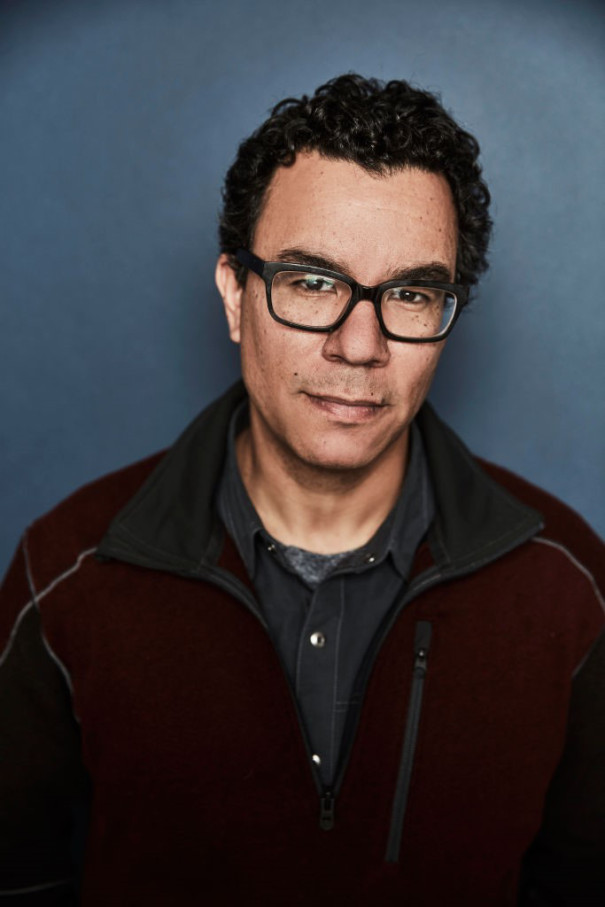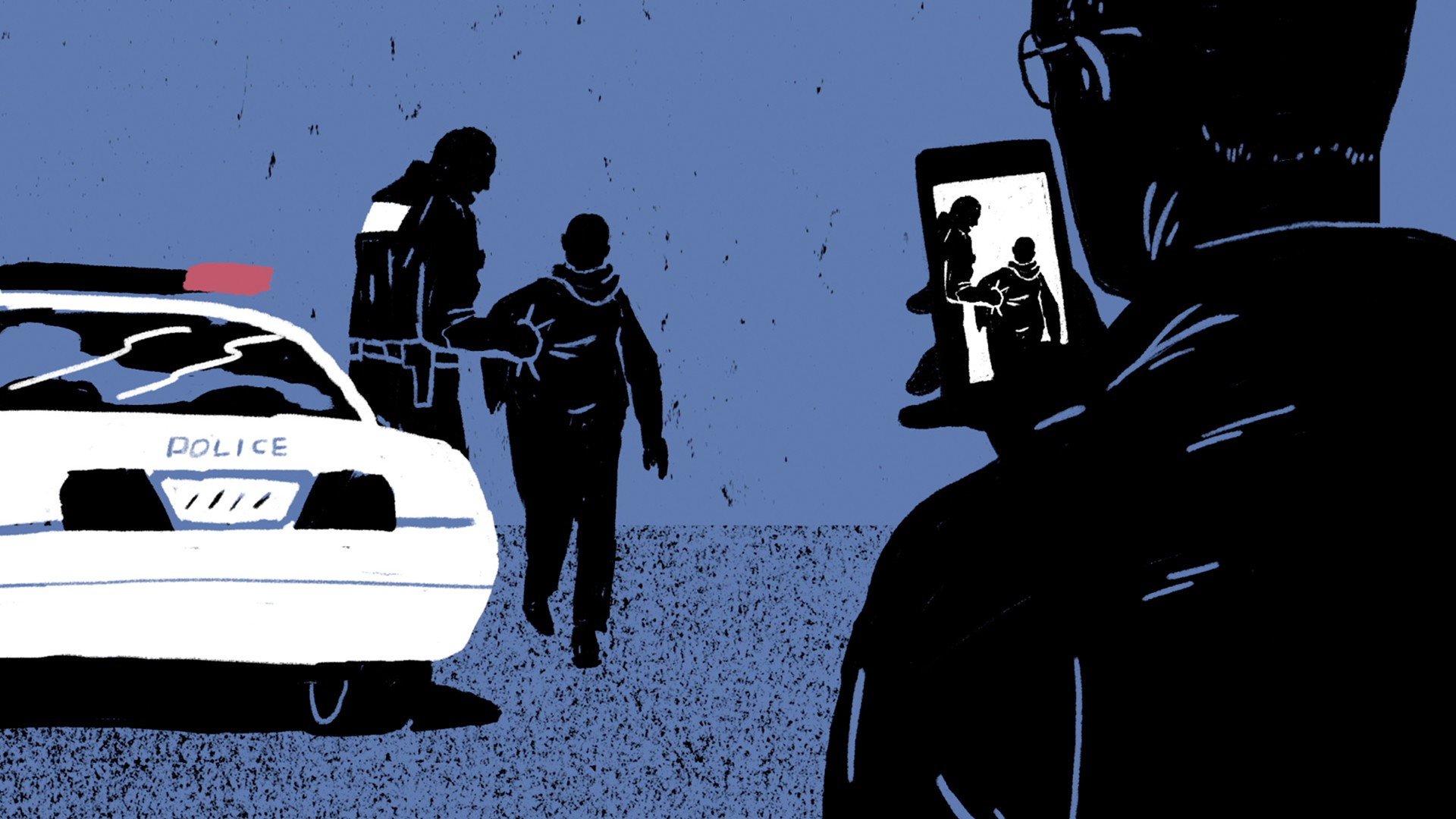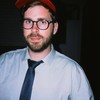Image via Cinetic
There’s a major plot twist at about the halfway mark of filmmaker Peter Nicks’ film The Force that recontextualizes everything you’ve seen so far, and everything yet to come . But the shocking turn-around isn’t some Shyamalan-esque switcheroo in a big budget fictional thriller -- it’s real life.The Force is the story of the inner workings of the embattled Oakland Police Department’s attempts to right itself ten years after a major civil rights lawsuit rocked the OPD and the local community. A decade of federal oversight later, and Nicks (whose first film, The Waiting Room, was set in Oakland's Highland Hospital) chronicles police chief Sean Whent’s efforts to break down what newly elected Oakland mayor Libby Schaaf called the department’s “toxic macho culture” into an era of community-backed police accountability.By tracing the city’s troubled relationship between the police versus seemingly everyone else, starting with the rise of the Black Panthers on the city’s streets in the late ’60s to the rise of the Black Lives Matter movement in 2013, Nicks’ intimate portrait unfolds as a balanced exploration of the truth.VICE Impact spoke to Nicks about the film -- which is now available on VOD -- getting to the truth, and what it means to be on both sides of such a fiery issue.What made you decide to make The Force your next film?I'm doing a trilogy looking at this one particular community and trying to tell its grand narrative, asking the question: What gives a community and individuals in that community agency?I knew the three pillars would be health care, criminal justice, and education. What order they came in I had no idea.What was the planning process like gaining access to the Oakland Police Department considering it had been under federal oversight for a decade before you made the film?It was both them wanting to tell their story -- they were moving through a process of reform that was yielding some results -- and also transparency in progressive departments had become de rigueur. My first film was sort of well respected, and I became a known artist in the community, and that helped.Was there any pushback on what you could and could not show from police department officials internally?The ride-alongs were probably the easiest, the Academy was difficult. They did not want us in the Academy because recruits are learning, they're making mistakes, they're new. But we got in.Just in general, shooting the upper command stuff, they interact with a lot of people and you can't just kind of run into a room to shoot things. It was an hour-by-hour process, and we got quite a bit of what we asked for. How do you as a filmmaker plan the narrative of a documentary like this?You don't! We had thematic questions in mind, and areas we wanted to explore. It's things that are going to be important to how people engage with the movie. Police accountability in particular is a subject people have either very strong opinions about or personal experiences with -- race, power, use of force, gender, those are all things that we went in wanting to explore.You just have to allow the process to lead you and be open to shifting gears if necessary. It's going to be much different than what you set out to do.Decisions are made all along the process in terms of where you choose to go, where you position the camera, how you shoot it, and all into the edit. We have a very close-knit team the whole way through, and we're constantly asking ourselves 'Where is this going? What does it mean? Does it fit into our preconceptions?' It gets scary when you're trying to reconcile the truth as you see it versus your perception of how the audience can hold the film.There’s a theme throughout the film about how phone cameras are tools for citizen activists and body cameras are tools for the police, narratively. The other layer is that you’re there with the film camera with your own narrative. Is that something you’re conscious of when trying to show quote unquote ‘truth’?Social media plays a very strong role in how we perceive the truth because now we can group ourselves around people who see the world as we do. We can be in those bubbles, and it's very hard for us to pull away from that and see reality from someone else's point of view. Whether it's an activist trying to understand life through the eyes of a cop or vice versa, that's very difficult to do. My style of storytelling is very observational and really asking the audience to do that. Part of our macro plan was to challenge the way people see themselves and their community.You show both sides, but how did you insure that you weren’t just a kind of PR or propaganda for the police? How did you keep that distance?Multiple things can be true. We're all prone to moral failure. But the thing about PR is that it's self-interested. You may tell the truth on some level, but you're not telling the full story. That's where we felt if we went in there and just showed what we saw -- and if what we saw was them doing good things -- then our feeling would be that we're missing something. The audience would get that too.We guaranteed a very long, deep commitment to the location and the characters themselves. It was a three-year project, and because we stuck around and put that commitment in, then things eventually revealed themselves that spoke to the deep concern that a lot of people have for this institution.
How do you as a filmmaker plan the narrative of a documentary like this?You don't! We had thematic questions in mind, and areas we wanted to explore. It's things that are going to be important to how people engage with the movie. Police accountability in particular is a subject people have either very strong opinions about or personal experiences with -- race, power, use of force, gender, those are all things that we went in wanting to explore.You just have to allow the process to lead you and be open to shifting gears if necessary. It's going to be much different than what you set out to do.Decisions are made all along the process in terms of where you choose to go, where you position the camera, how you shoot it, and all into the edit. We have a very close-knit team the whole way through, and we're constantly asking ourselves 'Where is this going? What does it mean? Does it fit into our preconceptions?' It gets scary when you're trying to reconcile the truth as you see it versus your perception of how the audience can hold the film.There’s a theme throughout the film about how phone cameras are tools for citizen activists and body cameras are tools for the police, narratively. The other layer is that you’re there with the film camera with your own narrative. Is that something you’re conscious of when trying to show quote unquote ‘truth’?Social media plays a very strong role in how we perceive the truth because now we can group ourselves around people who see the world as we do. We can be in those bubbles, and it's very hard for us to pull away from that and see reality from someone else's point of view. Whether it's an activist trying to understand life through the eyes of a cop or vice versa, that's very difficult to do. My style of storytelling is very observational and really asking the audience to do that. Part of our macro plan was to challenge the way people see themselves and their community.You show both sides, but how did you insure that you weren’t just a kind of PR or propaganda for the police? How did you keep that distance?Multiple things can be true. We're all prone to moral failure. But the thing about PR is that it's self-interested. You may tell the truth on some level, but you're not telling the full story. That's where we felt if we went in there and just showed what we saw -- and if what we saw was them doing good things -- then our feeling would be that we're missing something. The audience would get that too.We guaranteed a very long, deep commitment to the location and the characters themselves. It was a three-year project, and because we stuck around and put that commitment in, then things eventually revealed themselves that spoke to the deep concern that a lot of people have for this institution.
Check out more videos from VICE:
Do you think people will be more or less likely to be trustworthy of police after watching the film?We're potentially going to work with a group at Stanford to answer that and explore that question, but we haven't done a poll yet. Anecdotally, we've had lots of people say, 'I didn't realize their world was quite like that.' You kind of know any police department faces many challenges, but with OPD it's more, and we didn't even show the half of it.The movie shows only a portion of reality, but a lot of activists who have seen the film seem to root for the cops, the chief, and what not, and then they come away realizing it's more complex and difficult than what they thought.But there’s also the flip-side. Like the ouster of Sean Whent: Is Whent a good cop or a bad cop? Can he be both? What was that moment like for you?I don't think the chief is evil. But I felt betrayed to some degree [when Whent steps down after it’s revealed OPD officers were involved in a sex trafficking operation involving an underage prostitute and Chief Whent possibly participated in a cover-up]. In this process you get to know people, and at that point we'd spent two years at the department. We believed that this was the guy that would turn things around, but then that happened.I think even though I'm not an activist filmmaker, the film advocates for federal oversight pretty strongly. The protestors at the end of the film say, 'We can't see inside those walls, you can.' That's happening not just in police departments, but in the catholic church, and in Hollywood now. Individually, our actions can reflect internal cultural problems that have to be addressed, and we have to have mechanisms to hold people accountable.This interview has been edited for brevity and clarity
Advertisement
Advertisement

Advertisement
Advertisement
Check out more videos from VICE:

Do you think people will be more or less likely to be trustworthy of police after watching the film?We're potentially going to work with a group at Stanford to answer that and explore that question, but we haven't done a poll yet. Anecdotally, we've had lots of people say, 'I didn't realize their world was quite like that.' You kind of know any police department faces many challenges, but with OPD it's more, and we didn't even show the half of it.The movie shows only a portion of reality, but a lot of activists who have seen the film seem to root for the cops, the chief, and what not, and then they come away realizing it's more complex and difficult than what they thought.But there’s also the flip-side. Like the ouster of Sean Whent: Is Whent a good cop or a bad cop? Can he be both? What was that moment like for you?I don't think the chief is evil. But I felt betrayed to some degree [when Whent steps down after it’s revealed OPD officers were involved in a sex trafficking operation involving an underage prostitute and Chief Whent possibly participated in a cover-up]. In this process you get to know people, and at that point we'd spent two years at the department. We believed that this was the guy that would turn things around, but then that happened.I think even though I'm not an activist filmmaker, the film advocates for federal oversight pretty strongly. The protestors at the end of the film say, 'We can't see inside those walls, you can.' That's happening not just in police departments, but in the catholic church, and in Hollywood now. Individually, our actions can reflect internal cultural problems that have to be addressed, and we have to have mechanisms to hold people accountable.This interview has been edited for brevity and clarity
